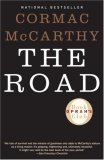Reading Guide Questions

Please be aware that this discussion guide will contain spoilers!
ABOUT THIS BOOK
Set in the smoking ashes of a postapocalyptic America, Cormac McCarthy's
The Road tells the story of a man and his son's journey toward the sea and an uncertain salvation. The world they pass through is a ghastly vision of scorched countryside and blasted cities "held by cores of blackened looters who tunneled among the ruins and crawled from the rubble white of tooth and eye carrying charred and anonymous tins of food in nylon nets like shoppers in the commissaries of hell" [p. 181]. It is a starved world, all plant and animal life dead or dying, some of the few human survivors even eating each other alive.
The father and son move through the ruins searching for food and shelter, trying to keep safe from murderous, roving bands. They have only a pistol to defend themselves, the clothes they are wearing, a cart of scavenged food--and each other.
Awesome in the totality of its vision,
The Road is an unflinching meditation on the worst and the best that we are capable of: ultimate destructiveness, desperate tenacity, and the tenderness that keeps two people alive in the face of total devastation.
Reader's Guide
- Cormac McCarthy has an unmistakable prose style. What do you see as the most distinctive features of that style? How is the writing in The Roadin some ways more like poetry than narrative prose?
- Why do you think McCarthy has chosen not to give his characters names? How do the generic labels of "the man" and "the boy" affect the way in which readers relate to them?
- How is McCarthy able to make the postapocalyptic world of The Road seem so real and utterly terrifying? Which descriptive passages are especially vivid and visceral in their depiction of this blasted landscape? What do you find to be the most horrifying features of this world and the survivors who inhabit it?
- McCarthy doesn't make explicit what kind of catastrophe has ruined the earth and destroyed human civilization, but what might be suggested by the many descriptions of a scorched landscape covered in ash? What is implied by the father's statement that "On this road there are no godspoke men. They are gone and I am left and they have taken with them the world" [p. 32]?
- As the father is dying, he tells his son he must go on in order to "carry the fire." When the boy asks if the fire is real, the father says, "It's inside you. It was always there. I can see it" [p. 279]. What is this fire? Why is it so crucial that they not let it die?
- McCarthy envisions a postapocalyptic world in which "murder was everywhere upon the land" and the earth would soon be "largely populated by men who would eat your children in front of your eyes" [p. 181]. How difficult or easy is it to imagine McCarthy's nightmare vision actually happening? Do you think people would likely behave as they do in the novel, under the same circumstances? Does it now seem that human civilization is headed toward such an end?
- The man and the boy think of themselves as the "good guys." In what ways are they like and unlike the "bad guys" they encounter? What do you think McCarthy is suggesting in the scenes in which the boy begs his father to be merciful to the strangers they encounter on the road? How is the boy able to retain his compassion--to be, as one reviewer put it, "compassion incarnate"?
- The sardonic blind man named Ely who the man and boy encounter on the road tells the father that "There is no God and we are his prophets" [p. 170]. What does he mean by this? Why does the father say about his son, later in the same conversation, "What if I said that he's a god?" [p. 172] Are we meant to see the son as a savior?
- The Road takes the form of a classic journey story, a form that dates back to Homer's Odyssey. To what destination are the man and the boy journeying? In what sense are they "pilgrims"? What, if any, is the symbolic significance of their journey?
- McCarthy's work often dramatizes the opposition between good and evil, with evil sometimes emerging triumphant. What does The Road ultimately suggest about good and evil? Which force seems to have greater power in the novel?
- What makes the relationship between the boy and his father so powerful and poignant? What do they feel for each other? How do they maintain their affection for and faith in each other in such brutal conditions?
- Why do you think McCarthy ends the novel with the image of trout in mountain streams before the end of the world: "In the deep glens where they lived all things were older than man and they hummed of mystery" [p. 287]. What is surprising about this ending? Does it provide closure, or does it prompt a rethinking of all that has come before? What does it suggest about what lies ahead?
Unless otherwise stated, this discussion guide is reprinted with the permission of Vintage.
Any page references refer to a USA edition of the book, usually the trade paperback version, and may vary in other editions.

 Book Reviewed by:
Book Reviewed by:





